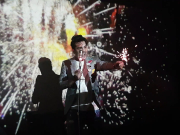Pakistani pop music takes on the Taliban
Riddhi Shah
The Atlantic
For a few days this past summer, a Pakistani music show called Coke Studio became the 11th most watched channel on Youtube. Around the same time, it also became one of the most Googled terms in Europe.
The show, which is similar to the British music series Live from Abbey Road, has been growing in popularity since 2009. This summer’s spike came in part because of ‘Alif Allah Chambey Di Booty’, a Punjabi song performed by a squat, aging Pakistani folk musician with a curling mustache. At last count, it had received close to 3 million hits on YouTube.
It’s not hard to understand the song’s appeal. The folk musician is accompanied by a female singer in a cropped leather jacket, tight jeans, and siren-red lipstick. Traditional instruments like the two-pronged chimta compete with the guitar and the synthesizer. It’s a faultless fusion of the new and the old, a rare image for Pakistanis used to seeing their country portrayed as fundamentalist and monolithic. Consider this comment by a YouTube user: “This is the soul of Pakistan…..this is me.”
Such responses reflect Coke Studio’s essential philosophy. Producer Rohail Hyatt says the idea for the show coalesced when he was working as a consultant for Coca-Cola four years ago. Initially, Coke, which has long played second fiddle to Pepsi in Pakistan, rejected the idea. “It was certainly a challenge to convince them that the concept would have mass appeal,” Hyatt says. Eventually, though, the corporation agreed.
When the show first aired on Pakistani television in the summer of 2008, it received a lukewarm response. At the time, violence related to growing Islamic militancy was limited to the distant North-West Frontier Province and Balochistan. The rest of the country was yet to feel the wrath of the Taliban.
But by the show’s second season, the Taliban had begun to attack cities like Lahore, Karachi, and Islamabad. Simultaneously, the global spotlight on Pakistan intensified. Pakistanis found themselves under increasing scrutiny as linchpins in the war against Islamic terrorism. “We wanted the show to be a process of self-discovery, of finding a new way of looking at ourselves,” says Hyatt. “We receive so much negative press that it’s easy to forget who we really are.”
Under Hyatt’s direction, Coke Studio’s music began to take on a spiritual (though not necessarily religious) character, featuring collaborations between shrine singers and rock bands. Its playlist also began exploring the country’s many linguistic, cultural, and specifically non-Islamcentric facets–showcasing, for instance, a pair of Pashto-speaking, guitar-playing sisters singing a love song in Turkish as well as a classical musician singing an old Indian desert folk song.
Suddenly, the show’s popularity skyrocketed. Its website crashed repeatedly, unable to handle the unexpected onslaught of traffic.
Since its inception, Coke Studio has displayed unusual Internet-savvy: The only way to access each season’s songs is by downloading them through the show’s website. (The producers don’t release albums.) Videos are uploaded on Facebook and YouTube as soon as an episode airs, and Hyatt believes deeply in the free distribution of music.
All of this has dovetailed with the growing Pakistani movement toward online activism. Pakistan’s Internet-using population has grown exponentially over the past few years; it’s now estimated to be 20 million strong. In 2007, when President Pervez Musharraf sacked Chief Justice Iftikhar Chaudhry, Pakistanis used the still fledgling Twitter to organize protest rallies. In March 2009, social networking site Facebook was vital in bringing together the lawyers’ march that helped reinstate the country’s dismissed judges.
Coke Studio’s Facebook page currently has more than 400,000 fans. “Last, year, one of Coke Studio’s most popular songs had the chorus ‘Bas kareen o yaar’ (‘Enough my friend’). Several friends made it their status message,” says Suhaib Jalis Ahmed, a 22-year-old business student. “They dwelt on it for weeks, looking for inspiration.” A few months ago, Ahmed wrote a blog post for Pakistan’s Express Tribune newspaper comparing Coke Studio to the progressive Muslim Caliphate in eighth century Spain.
If YouTube comments are any indication, Coke Studio’s viewers live in places as far-flung as Taiwan, Utah, the Netherlands, India, and New Zealand. The show has become especially popular in Europe, a continent that is home to one of the largest populations of Pakistani expats. “The Diaspora feels the demonization of Pakistan even more acutely than those of us who live inside the country,” says cultural critic Fasi Zaka. “For them, finding something like this on the Internet means that that they can show it the rest of the world.”
And showing it they are–Hyatt says he’s received emails from Japan and Moscow, while Adnan Malik, a filmmaker and video producer for Coke Studio, says he’s gotten requests for events in Singapore and San Francisco. The show’s music is also on the soundtrack of the soon-to-be-released British film West is West. “People are interested in the counter-narrative coming out of Pakistan,” says Malik, “Maybe people are ready to think of Pakistan as more than just the most dangerous place on the planet.”
To an outsider, the content of Coke Studio, with its blend of modern and traditional styles, might seem relatively tame. But to fundamentalist Muslims, the very act of creating music is often seen as haraam, or blasphemous. Throughout the 1980s, military dictator Muhammed Zia-ul-Haq banned music videos and albums in an effort to Islamicize the nation. In the mid-1990s, when wild-haired rock band Junoon was singing about accountability and poor governance, Prime Minister Nawaz Sharif forbade Pakistanis from wearing long hair and jeans on television.
Pakistan’s music industry has repeatedly bucked fundamentalist repression and reemerged as a voice of protest, a legacy that continues at Coke Studio. For instance, it’s no coincidence that so many of Coke Studio’s songs are Sufi-influenced. Even though the mystical philosophy finds its roots in Islam, its use of music and worship of saints makes it heretical to conservative Muslims. In the past year, the Taliban has bombed Sufi shrines in Peshawar and banned a music program at a prison in Karachi. By promoting Sufi culture, Coke Studio is sending out a message to its viewers, setting itself in distinct opposition to the Taliban’s narrow vision of Islam and Pakistan.
As Coke Studio’s fame grows, so does the threat from fundamentalists. “I think there’s definitely been some intimidation,” says Omar Bilal Akhtar, whose indie band, The Aunty Disco Project, performed on the show’s third season. “Season three was conducted very differently from earlier seasons. We were asked to keep the location of the studio secret. The last two times, journalists and audiences were allowed in.”
Hyatt sees secrecy only as a precautionary measure to protect his staff and artists. He has no plans to rein in the show’s influence or message. “The only thing you can do to win that war is to not be scared,” he says.
—Photos by Kohi Marri & Rizwan ul Haq
Source : Instep Today











































